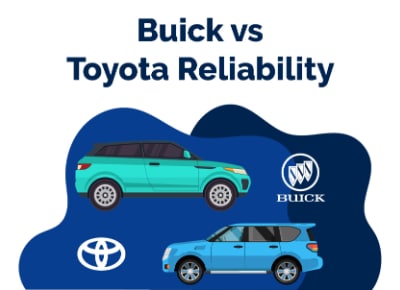Buick vs Toyota: Which Is More Reliable?
June 26, 2023


Chris is Head of Content for FindTheBestCarPrice and is based out of Philadelphia, PA. As a seasoned automotive industry analyst and car enthusiast, he ensures the highest level of quality across all our content and curates our picks for the best deals each month.
Chris studied information systems and marketing at Drexel University and writes about a wide range of topics ranging from car buying tips to troubleshooting common mechanical issues.
When he’s not thinking about cars, he likes to stay in with his dog and make an “attempt” to finish a crossword puzzle (he’s not quite at the Saturday/Sunday level…yet). As a former cheesemonger, Chris still has a “sharp” passion for all things cheese, and his fridge is always loaded with it!
Chris also has a passion for things that go fast, and drones are no exception. He spends some of his time writing for Dronesourced.
Selecting a dependable car involves considering various factors such as design, maintenance expenses, longevity, and safety. Toyota and Buick are two automobile manufacturers consistently recognized for their dependability.
However, Toyota cars are more reliable than Buick. As per RepairPal, a nationally recognized organization dedicated to assisting drivers in finding reliable local service and auto shops, Buick has a reliability rating of 3.5 out of 5.0 and stands at 13th place among 32 car brands, providing a reasonable ownership cost for a luxury brand.
Toyota cars are renowned for having minimal mechanical issues. It is not unusual to see them still used even after two decades. Toyota ranks 8th among all car brands, with a reliability rating of 4.0 out of 5.0 based on an average of 345 unique models.
Now, let’s quickly learn more about Buick vs. Toyota's reliability!
Table of Contents
- Buick vs. Toyota Reliability: Detailed Comparison
- Which is the Best Car: Buick or Toyota?
- 1. Buick vs. Toyota Reliability: Design
- 2. Buick vs. Toyota Reliability: Repairs and Maintenance Cost
- 3. Buick vs. Toyota Reliability: Durability
- 4. Buick vs. Toyota Reliability: Engine
- 5. Buick vs. Toyota Reliability: Gas Mileage
- 6. Buick vs. Toyota Reliability: Technology
- 7. Buick vs. Toyota Reliability: Safety
- Final Verdict
- Best Car Deals by Category
Buick vs. Toyota Reliability: Detailed Comparison
| Features | Buick | Toyota |
| Design | ||
| Repairs and Maintenance Cost | ||
| Durability | ||
| Engine | ||
| Gas Mileage | ||
| Technology | ||
| Safety |
Which is the Best Car: Buick or Toyota?
When drivers compare the Buick and Toyota brands to determine the better car, it can be challenging due to each brand's loyal followers.
Buick is renowned for being a dependable provider of luxury, offering plush interiors and comfortable rides that are often considered a status symbol for those looking to display their wealth.
On the other hand, Toyota has earned a highly esteemed reputation for using advanced technology in automotive engineering, resulting in a lineup of mechanically superior and reliable vehicles.
Toyota's dedication to manufacturing automobiles that are fuel-efficient, long-lasting, low-cost maintenance, and environmentally friendly has been consistently demonstrated.
In contrast, Buick vehicles may be more prone to mechanical issues and require higher maintenance expenses than Toyota cars.
1. Buick vs. Toyota Reliability: Design
Buick and Toyota brands have unique styles and aesthetics regarding automobile design.
Buick is typically associated with a classic and traditional design highlighting elegant curves and sophisticated lines.
At the same time, Toyota is renowned for its contemporary and futuristic designs featuring sleek angles and daring contours.
Buick's vehicles tend to have a more imposing presence on the road due to their larger size and bulkier appearance.
In contrast, Toyota designs often exude a more restrained and conservative aesthetic emphasizing functionality over ostentation. These distinct design philosophies cater to different customer preferences.
Regarding interior design, Buick vehicles generally offer a more luxurious feel, featuring premium materials and intricate details. Meanwhile, Toyota interiors prioritize practicality, ergonomic efficiency, and user-friendliness.
Both Buick and Toyota have their strengths when it comes to design. Buick's classic and elegant style and luxurious interiors appeal to customers looking for a premium experience.
On the other hand, Toyota's focus on functionality and conservative aesthetics attracts customers looking for a practical and reliable vehicle.
Winner: Both
2. Buick vs. Toyota Reliability: Repairs and Maintenance Cost
Buick and Toyota brands have unique characteristics regarding the expenses associated with repairs and maintenance.
Buick vehicles are often associated with high-end features that can be costly and require specialized maintenance. In contrast, Toyota cars are known for their reliability and practicality, which can reduce expenses in the long run.
Buick models typically come equipped with luxurious components such as advanced safety features and premium sound systems, which can result in expensive repairs and replacements.
Additionally, the larger size of Buick vehicles can lead to higher costs for routine maintenance, such as tire replacements and oil changes.
In contrast, Toyota models have significantly lower maintenance and repair costs, with an average expenditure of $5,996, surpassing the industry average for popular brands by $818.
These cost savings are a testament to Toyota's unwavering dedication to producing high-quality vehicles prioritizing durability and reliability.
Moreover, Toyota cars have a reputation for their low rate of significant repairs, which further reduces the overall expenses of ownership.
Toyota cars outshine Buick models when it comes to repair and maintenance costs. Toyota's commitment to reliability and practicality reduces expenses in the long run.
In contrast, Buick's high-end features can lead to expensive repairs and maintenance. Based on this analysis, Toyota is the clear winner regarding affordability and long-term cost savings.
Winner: Toyota
3. Buick vs. Toyota Reliability: Durability
Buick cars are robustly built, which makes them durable and able to withstand the effects of time and use.
However, this sturdiness may come at the cost of fuel efficiency, as their weighty design can lead to suboptimal gas mileage compared to competitors.
In contrast, Toyota models are consistently recognized for their supreme durability, with reliability being the primary focus during the design and manufacturing.
Toyota's robust craftsmanship and engineering make them an outstanding selection for those who desire long-term dependability and durability.
When it comes to durability, Toyota is the clear winner. While Buick's cars are also known for their robust build quality, the weighty design may lead to decreased fuel efficiency.
Toyota's focus on reliability and durability results in vehicles that can last years without significant repairs or maintenance.
Winner: Toyota
4. Buick vs. Toyota Reliability: Engine
Buick's turbocharged engine is undoubtedly impressive, with an output of 404 horsepower and Variable Valve Timing technology that balances power and fuel efficiency.
However, Toyota's GR series V6 engines are also renowned for their excellence, with the latest 2GR-FKS 3.5L V6 engine delivering up to 301 horsepower and 267 pound-feet of torque in the Camry and Avalon.
Toyota's commitment to innovation is exemplified by its A25 Dynamic Force engine family, which includes a range of designs from I-3 engines to twin-turbo V6 designs.
With upgraded fuel injection and VVT-i applied to both intake and exhaust valves, the V35A-FTS engine is a remarkably advanced and powerful twin-turbo design.
In terms of engine technology, both Buick and Toyota offer impressive options. However, Toyota's commitment to innovation and advanced designs gives them an edge.
Winner: Toyota
5. Buick vs. Toyota Reliability: Gas Mileage
Buick's focus on fuel efficiency is evident in its impressive gas mileage of 22 MPG city and 29 MPG highway, achieved through advanced fuel-saving technology.
The Buick model features an automatic start-stop system that conserves fuel by deactivating the vehicle when the vehicle is stationary. Its streamlined design reduces drag and turbulence to optimize fuel efficiency.
On the other hand, Toyota is a brand known for its fuel efficiency, with many models averaging over 30 miles per gallon on the highway.
The Camry, one of Toyota's most popular models, boasts a steady 33 miles per gallon on the highway and 24 miles per gallon in the city.
The Camry has also won the best-selling car award in 13 out of the last 14 years, making it a reliable and popular choice.
The Toyota Yaris, a hatchback model, is another standout in gas mileage, getting an impressive 30 miles per gallon in the city and 36 miles per gallon on the highway.
It also offers plenty of cargo space, making it an excellent option for road trips or moving furniture.
While Buick's gas mileage is notable, Toyota is the clear winner regarding fuel efficiency, with many of its models offering exceptional gas mileage.
6. Buick vs. Toyota Reliability: Technology
Buick offers a comprehensive Connected Vehicle Plan with features such as In-Vehicle Apps, Remote Access, and In-Vehicle Wi-Fi Hotspot data. The myBuick mobile app provides users with various vehicle functions.
At the same time, the built-in Wi-Fi Hotspot can connect up to seven devices for passengers' entertainment during their journey.
Moreover, the Amazon Alexa Built-in feature allows users to use their voice to perform several tasks hands-free. The OnStar Safety & Security Plan offers emergency services, roadside assistance, and stolen vehicle assistance, among others.
In contrast, Toyota is a renowned innovator and philanthropist, with the Hybrid Synergy Drive technology powering millions of hybrid vehicles and reducing harmful pollutants.
Furthermore, the company's commitment to eco-friendly technology is evident in the launch of the Toyota Mirai fuel cell vehicle and the release of several patents related to fuel cell development.
These efforts demonstrate Toyota's commitment to sustainability and society's greater good.
Winner: Toyota
7. Buick vs. Toyota Reliability: Safety
Buick's newest vehicle lineup has many standard safety features, including forward collision warning, lane departure warning, and automatic emergency braking. These features provide drivers with additional protection while on the road.
Buick also enhances its commitment to safety by outfitting its latest models with an advanced safety package that includes adaptive cruise control, rear cross-traffic alert, and a 360-degree camera system.
These features work together to enhance the safety measures of Buick's vehicles and provide drivers with the utmost protection.
Toyota also prioritizes driver safety by offering a suite of advanced safety features, such as the Pre-Collision System with Pedestrian Detection, Dynamic Radar Cruise Control, Lane Departure Alert with Steering Assist, Automatic High Beams, Lane Tracing Assist with Emergency Driving Stop System, Road Sign Assist, and Proactive Driving Assist.
These features help drivers avoid collisions and maintain safe driving practices. Both car manufacturers are committed to enhancing driver safety and providing vehicles that prioritize the protection of their passengers.
Winner: Both
Final Verdict
While Buick and Toyota cars might exhibit commendable reliability, it goes without saying that Toyota cars are more reliable. Of the seven categories covered, Toyota dominated six of them.
Best Car Deals by Category
Posted in Car Buying Tips, Car Troubleshooting |




